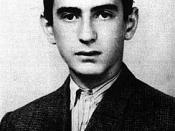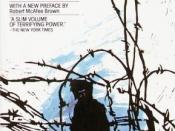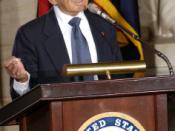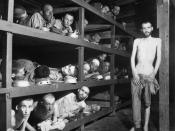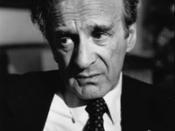In Night Elie Wiesel had two thoughts on humanity. He explored how evil humans can be and how resilient humans can be to such cruelty. The prisoners managed to not lose hop throughout all of the hardships they went through.
Elie Wiesel showed many ways that people can be evil towards others. In the concentration camps the guards were allowed to do whatever they wanted. In the beginning of the story when Moshe the Beadle returned from deportation he told a story about what the guards did. In one passage it says. "Babies were thrown into the air and the machine gunners used them as targets."ÃÂ [Wiesel, 4] The Nazi's cared so little about the people they were imprisoning that they could do such cruel and inhumane things to even babies that were totally innocent. In another passage it shows how selfishly evil people can become. The prisoners are in a train and people are throwing food into the train to watch them fight for it.
The passage is of an old man coming out with some food and getting beat on by his own son. The passage reads, "Meir, Meir, my boy! Don't you recognize me? I'm your father"æyou're hurting me"æyou're killing your father! I've got some bread"æfor you too"æ"à[Wiesel, 96] "He collapsed. His fist still clenched around a small piece. He tried to carry it to his mouth. But the other one threw himself upon it and snatched it. The old man again whispered something, let out a rattle, and died amid the general indifference. His son searched him, took the bread and began to devour it."à[Wiesel, 96] People can be so selfish that they will do anything to get what they want. This old man got food for his son, but he killed him so he would not have to share with his father.
Elie Wiesel also explored how humans can be very resilient to such evil acts. Elie survived the concentration camps because he was a resilient boy. Elie did some brave things to stay with his father even if it meant injuring himself. In one passage it talks about how after Elie had surgery on his foot that he was willing to surpass the pain to be with his father. The camp is going to be evacuated and Elie was not sure to march with the rest of the prisoners or stay back in the infirmary and not know what was going to happen to him. The passage is of Elie thinking. It says, "As for me, I was not thinking about death, but I did not want to be separated from my father. We had already suffered so much, borne so much together; this was not the time to be separated."ÃÂ [Wiesel, 78] Elie even being just a boy was very capable of carrying out something he wanted very much under such extreme circumstances.
People often did some normally strange things to survive. They used the little that they had to do what they could to survive. During a march to another camp after being evacuated, people were just eating anything they could get. In one passage it talks about one of the things people did. It says, "Someone had the idea of appeasing his thirst by eating snow. Soon the others were imitating him. As we were not allowed to bend down, everyone took out his spoon and ate the accumulated snow off his neighbors back. A mouthful of bread and a spoonful of snow."ÃÂ [Wiesel, 92] Even though the people were only given a small amount of bread to eat they still found something to drink. Using the snow to quench their thirst showed how resilient humans can be.
Elie Wiesel explored two major thoughts on humanity. Humans can be both very evil, but can also rebound from the evils. Humans will find some means of surviving, even if those ways are not humane. Elie learned first hand how resilient humans are and how far they can be pushed even during the hardest of times.
